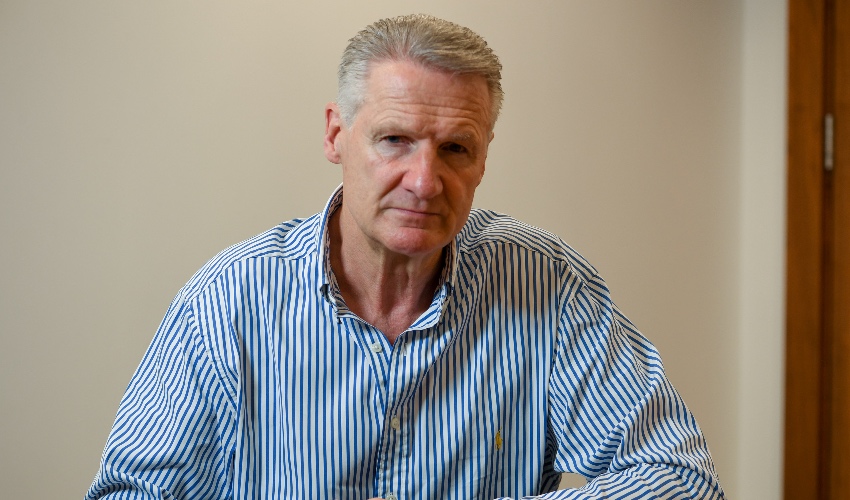


Focus groups involving disabled islanders and those with long-term health conditions will be among a range of events taking place in the build-up to next month’s States Assembly debate on assisted dying, the Health Minister has confirmed.
Responding to questions from the Assisted Dying Review Panel, chaired by Deputy Louise Doublet, the Health Minister acknowledged the importance of ensuring details of the proposed legislation were explained to those affected.
In a written response to the panel, Deputy Tom Binet said that engagement with disabled islanders would be undertaken in partnership with Enable Jersey and Acorn/Jersey Employment Trust, two organisations working to support disabled islanders and islanders with long-term health conditions.

Pictured: Health Minister Tom Binet acknowledged the importance of ensuring details of the proposed legislation were explained to those affected.
The engagement sessions during the second half of April will include focus groups and one-to-one interviews, he said, with the intention of providing additional opportunities to highlight the area of the proposed law focusing on those who would be able to choose to end their lives as a result of unbearable suffering.
Deputy Binet also confirmed that two further briefings for States Members would take place on 22 April and 13 May, in addition to a briefing that took place before Easter, and that there would be weekly drop-in sessions with health policy officers every Monday until the debate, which is scheduled for 21 May.
If approved, Jersey could become the first place in the British Isles to allow assisted dying.
The matter will also be discussed by the Council of Ministers over the coming weeks, with Deputy Binet confirming that a feedback report would be published by 7 May.
The Health Minister also faced questions from the Scrutiny panel during a public hearing this week, during which he dismissed concerns that legalising assisted dying will lead to a “slippery slope” where the numbers of those choosing assisted dying – and the criteria for making such a choice – gradually increase over time.
“I think in all the time that I’ve had an interest in assisted dying, I’ve had people mentioning the slippery slope – this means I respect that,” he said.
“All I would say is whatever rules and regulations may come about, to have any changes to those laws would require precisely the same degree of care and attention.
“The only slippage that can occur is if something goes back to the Assembly and [Members] actually ask for changes – those changes would have to go through the same rigorous process as we’ve already been through, so I personally find it something of a false argument.”

Pictured: Only adults who have lived on the island for 12 months and who are terminally ill or have an incurable condition with unbearable suffering would be eligible for assisted dying.
Deputy Binet stressed that government proposals underwent a “rigorous process”, and added that any changes made by States Members would undergo the same process.
Only adults who have lived on the island for 12 months and who are terminally ill or have an incurable condition with unbearable suffering would be eligible for assisted dying, according to the government’s proposition.
Deputy Binet defended his decision to bring forward the draft legislation – which followed a vote in favour of the principle of assisted dying by the States Assembly in 2021 – having been a key figure in the lobby group End of Life Choices prior to being elected to public office.
He said: “My personal view is probably reasonably well-known because I was heavily involved in the campaign to bring this law forward, but I don’t think it’s my place to impose my views on anybody.
“The States voted to put a process in place, that process is run and I, as the Health Minister, am putting the result of that process forward for people to vote upon – does that not seem appropriate?”
Pictured: The Assisted Dying Review Panel is chaired by Deputy Louise Doublet.
Deputies Louise Doublet and Catherine Curtis, members of the Assisted Dying Review Panel, questioned the Health Minister about the rights of disabled people, vulnerable adults and those aged under 18.
Deputy Binet said: “Somebody shouldn’t have a decision made for them because they become disabled.
“If I became disabled, I would find it patronising if somebody else came along and said, ‘you can’t have access to this because I’ve decided for you’ – that’s why I’ll be very, very clear: it’s about personal rights.”
Although he conceded that some might argue that certain under-18s were sufficiently mentally mature to make a decision about ending their lives, Deputy Binet said he felt it was “sensible” to include a minimum qualifying age of 18 in the legislation.
The Minister added that further work was needed to strengthen the safeguards for vulnerable adults, in the same way as children’s rights had become enshrined in recent years.
Comments
Comments on this story express the views of the commentator only, not Bailiwick Publishing. We are unable to guarantee the accuracy of any of those comments.